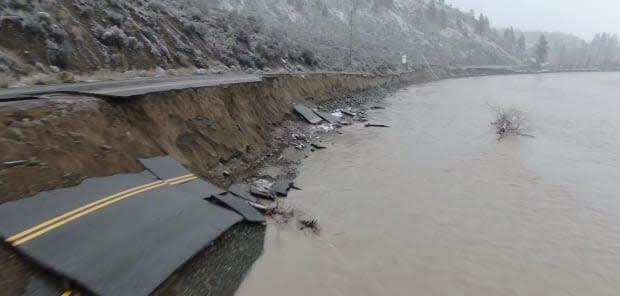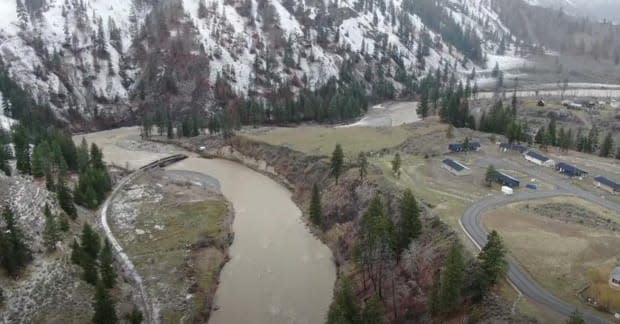'It's gone': Shackan Chief says floods have swept away First Nation's land, home

The leader of a 130-member First Nation in B.C.'s Nicola Valley that's been devastated by flooding says he's not sure when people can return home after seeing the devastation wrought by raging flood waters two weeks ago.
"Our whole livelihood has been washed away within 30 hours. Things are washed away … houses, fields, cattle and people. There's people [from the valley] still missing," said Shackan First Nation Chief Arnold (Arnie) Lampreau.
The Shackan Indian Band is one of five First Nations located along Highway 8 between Merritt and Spences Bridge.
After the neighbouring community of the Coldwater Indian Band were placed on evacuation alert, the chief said he and others went door to door to alert the approximately 45 residents living on reserve lands.

About a dozen refused to leave at first, but the rising flood eventually forced them to drive out in half a metre of water, he said.
None of his band members are missing, but at least one 70-year-old woman from the area is believed to have been swept away with her house.
According to Lampreau, hundreds of residents on reserve lands along Highway 8 initially fled to Merritt, which was later evacuated when the wastewater system failed. They were then moved to Kamloops, where Lampreau said many were told to wait in a hockey arena.
He said some Indigenous people waited hours — and in the worst cases, days — in their cars without food or help.
Almost two weeks after rain-driven floods ravaged Nicola River lands in B.C's southern interior, Lampreau says nobody from the provincial government has connected with him.
"I've told Emergency Management B.C. (EMBC) to pound sand because they didn't look after our people — we fell through the cracks," he said.
'It's heartbreaking'
The chief flew over the Nicola Valley on Wednesday to survey the losses, and described what he saw in a video call Thursday from his Merritt band office, where he and councillors are coordinating relief.
He said lines of telephone poles were sheared off and heavy steel bridges "tossed like toothpicks," while some homes had been swallowed by water and "erased" by the river.
"Now there's just rocks and river. There is no more land between those rocks and river," he said.

He paused and wiped his eyes.
"I've got elders asking me everyday ... 'Chief, do you think we are going to come home?' I'm scared that I'm going to lose them elders while we are out. They are not going to be able to see their homelands. They are not going to be able to see their grandchildren thriving on the lands that they cleared, that they prepared for them. It's gone."
"It's heartbreaking. It's hard for me to sleep at night," said Lampreau.
Highway 8 zone 'impacted beyond belief'
In a public daily briefing today, Public Safety Minister Mike Farnworth says Emergency Management B.C. is focused on helping people who have been driven from properties along Highway 8.
"That particular highway was impacted beyond belief," said Farnworth.
He said the military is helping with food and supply drops by helicopter and assessing the safety of highways.

He also said the province is working with the federal government to determine what's available for disaster relief, especially for farmers and ranchers who have lost everything in flood zones.
Minister of Municipal Affairs Josie Osborne also said the province can expect more catastrophic events in the future, nobody expects communities to handle rebuilding alone.
CBC has reached out to EMBC and the province for further comment.



